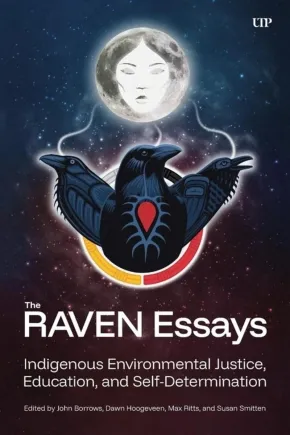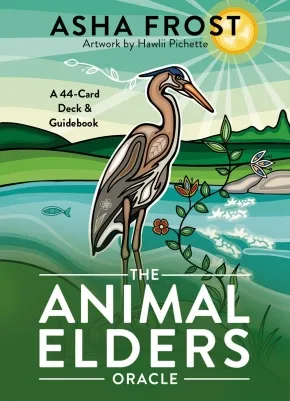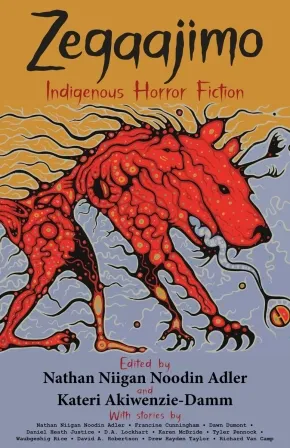
Chippewas of Nawash
1
-
5
of
5 Results;
Sort By
The RAVEN Essays: Indigenous Environmental Justice, Education and Self-Determination
$34.95
Editors:
Format:
Paperback
Text Content Territories:
Indigenous Canadian;
Reading Level: N/A
ISBN / Barcode: 9781487562380
Synopsis:
Synopsis:
Named after the Respecting Aboriginal Values and Environmental Needs (RAVEN) nonprofit organization, The RAVEN Essays is an anthology that celebrates a decade of prize-winning student essays. Since 2012, RAVEN has awarded an annual essay prize to honour students who champion the vital importance of Indigenous rights and self-determination, both in Canada and globally. The essays featured in this collection highlight exceptional student work while reflecting on the evolving relationship between Indigenous politics and academia. From issues like fishing rights and the Trans Mountain Pipeline to challenges of sexism and conservation policy, these essays capture a transformative period in Indigenous struggles, offering insights that resonate far beyond the Canadian settler state.
The anthology also includes contributions from prominent scholars such as Glen Coulthard, Dara Culhane, Michael Fabris, Sarah Hunt, and Heather Dorries. Five complementary essays explore various aspects of structural change, institutional constraints, and broader commitments to Indigenous knowledge within university settings. Aimed at readers in Indigenous law, environmental studies, anthropology, and geography, The RAVEN Essays is a book created by students for students, and by academics for the academy.
Together, the contributors reflect on the powerful formation and enactment of Indigenous law, environmental stewardship, place-based knowledge, pedagogy, and literacy – both within the academy and in the broader community, across land, water, and culture.
This collection celebrates emerging scholars in Indigenous studies, featuring student essays that explore Indigenous justice, ethics, and environmental justice, while highlighting a decade of collaboration with RAVEN, a legal defence organization.
Educator Information
Chapters
List of Illustrations
Acknowledgments
Introduction: The RAVEN Essays
Susan Smitten
1. Situating the Raven Stories
Dawn Hoogeveen, Max Ritts, and Heather Dorries
2. Making Meaning: Indigenous Legal Education and Student Action
John Borrows
Part One: Principles
3. (In)Voluntarily Enfranchised: Bill C-3 and the Need for Strengthening Kinship Laws in Treaty 4
Danette Jubinville
4. Sharing of the Dish: The Dish with One Spoon and Environmental Planning in Toronto
Da Chen
5. “My Story”
Wade Houle
Part Two: Relations
6. Lake One Trail: Exploring the Egheze Kue Aze (Egg Lake) Landscape in Wood Buffalo National Park of Canada
Laura Peterson
7. The Berry Picker
Atlanta Grant
8. Swimming Upstream against (Neo)colonialism: On Salmon Aquaculture Supremacy and the Decline of Sockeye in the Stó:lō
Erica Hiroko Isomura
Part Three: Struggles
9. Thieves of the North-West Coast: Understanding Indigenous and Non-Indigenous Relations in Clayoquot Sound, 1791–1792
André Bessette
10. The Fight for Water: Examining Environmental Racism and the Effects on First Nations Culture and Society in British Columbia
Kevin Ly
11. Indigenous Legal Systems and the Struggle for Recognition
Tosin Fatoyinbo
12. Contemporary Colonialism: The Dakota Access Pipeline
Helena Arbuckle
Conclusion: A RAVEN Roundtable
John Borrows, Glen Coulthard, Mike Fabris, Dawn Hoogeveen, Max Ritts, and Susan Smitten
Afterword: Raven Goes to School – (Re)learning Transformation from Graduate Students
Sarah Hunt – Tłaliłila’ogwa
Contributors
Index
Educator Information
306 pages | 6.00" x 9.00" | 11 Illustrations | Paperback
The Animal Elders Oracle: A 44-Card Deck & Guidebook of Indigenous Wisdom & Healing Medicine
$25.99
Artists:
Text Content Territories:
Indigenous Canadian; First Nations; Anishinaabeg; Ojibway;
Reading Level: N/A
ISBN / Barcode: 9781401978181
Synopsis:
Synopsis:
Tap into guidance from the animal spirit realm and connect to ancestral wisdom with this transformative 44-card deck and guidebook from Indigenous Medicine Woman and author of You Are the Medicine and The Sacred Medicine Oracle, Asha Frost.
Everything is interconnected. All of creation carries a spirit. Indigenous people have always had a sacred relationship with animals and treated them as honored elders. Animal beings in the spirit realm are part of our spiritual support team as allies and medicine keepers, ready to help, waiting to remind you of your humanity and deep connection to the natural world.
With 44 Elder Animals depicted in a richly detailed traditional Ojibway art style, each card carries its own unique medicine. This deck offers meaningful insights and messages to guide you on your path both from the universe and in the voice of an animal spirit guide from the lands of the Ojibway people—from Elder Artic Hare to Elder Wolf. Whether you're seeking clarity, healing, or a deeper connection to your ancestral lineage, these cards provide a bridge to the spirit world.
Use this deck your rituals and ceremonies, do readings with it for your clients and friends, and share it with your communities. As the medicine ripples out, hold Indigenous people in your heart and honor how their history continues to impact your current reality.
Additional Information
128 pages | 3.50" x 5.00" | Card Deck & Guidebook
Zegaajimo: Indigenous Horror Fiction
$28.00
Format:
Paperback
Text Content Territories:
Indigenous Canadian;
Reading Level: N/A
ISBN / Barcode: 9781928120445
Synopsis:
Synopsis:
A brand-new, spine-chilling collection of horror/thriller fiction, Zegaajimo, Anishinaabemowin for "to tell a scary story," includes stories from eleven leading First Nations and Metis authors from across the territories of Canada: Nathan Niigan Noodin Adler, Dawn Dumont, Daniel Heath Justice, D.A. Lockhart, Karen McBride, Tyler Pennock, Waubgeshig Rice, David A. Robertson, Drew Hayden Taylor, and Richard Van Camp.
Many of the stories draw on Traditional Stories. These stories of supernatural settings and deadful dees are more than speculative fiction, they are also reminders that monsters are already in our midst, that the known can be just as frightening as the unknown, and that the slightest mistakes can have dire consequences.
The collection is co-edited by Nathan Niigan Noodin Adler and Kateri Akiwenzie-Damm. Thrilling horror, Indigenous-style, perfect for Halloween!
Additional Information
230 pages | 5.50" x 8.50" | Paperback
The Sacred Medicine Oracle: A 56-Card Deck and Guidebook
$35.99
Artists:
Text Content Territories:
Indigenous Canadian; First Nations; Anishinaabeg;
Reading Level: N/A
ISBN / Barcode: 9781401966782
Synopsis:
Synopsis:
Connect with healing traditions, stories, ancestral wisdom, and animal guidance through this 56-card deck and guidebook from Indigenous Medicine Woman and author of You Are the Medicine, Asha Frost.
Indigenous people know the power of earth and spirit medicine. Everything in our natural world is interconnected and sacred. The plants, animals, rocks, waters, stars, moon are our relations, our kin. Every aspect of creation has a spirit. This spirit lives in all things and informs us how to walk in a good way or, in Anishinaabemowin, Mino-bimaadiziwin.
The Sacred Medicine Oracle was birthed to invite readers into a conscious and respectful relationship with medicine teachings, awakening a daily connection to your own inner divinity, power, and wisdom. From the powerful remembering of "Past Life Medicine" to the promise of miracles with "Jingle Dress," each of the 56 cards depicts ceremony, traditions, moon phases, animal guides, and plant allies, all of them alive with energy and blessed with healing intentions from the ancestors.
Additional Information
144 pages | 4.88" x 5.38" | 56 Cards and Guidebook
Voicing Identity: Cultural Appropriation and Indigenous Issues
$38.95
Editors:
Format:
Paperback
Text Content Territories:
Indigenous Canadian;
Grade Levels: 12; University/College;
ISBN / Barcode: 9781487544683
Synopsis:
Synopsis:
Written by leading Indigenous and non-Indigenous scholars, Voicing Identity examines the issue of cultural appropriation in the contexts of researching, writing, and teaching about Indigenous peoples. This book grapples with the questions of who is qualified to engage in these activities and how this can be done appropriately and respectfully.
The authors address these questions from their individual perspectives and experiences, often revealing their personal struggles and their ongoing attempts to resolve them. There is diversity in perspectives and approaches, but also a common goal: to conduct research and teach in respectful ways that enhance understanding of Indigenous histories, cultures, and rights, and promote reconciliation between Indigenous and non-Indigenous peoples.
Bringing together contributors with diverse backgrounds and unique experiences, Voicing Identity will be of interest to students and scholars studying Indigenous issues as well as anyone seeking to engage in the work of making Canada a model for just relations between the original peoples and newcomers.
Reviews
"This book is a beautiful and fearless gift to those willing to be challenged about popular public claims regarding a range of cultural appropriation issues. The editors and contributors have created a rich and contextual resource to generate critical conversations about forms of lateral violence and unproductive silencing, and about our need for ‘deliberate unknowing’ so we have space for real learning, practical institutional change, and inclusivity. This collection invites us to ask how ‘Raven steals the sun,’ making sure ‘we look both ways’ when reconsidering history, and thinking about the ‘we’ and the ‘ours.’"— Val Napoleon, IPC, Cree, Saulteau First Nation, Acting Dean and Professor and Law Foundation Chair of Indigenous Justice and Governance, Faculty of Law, University of Victoria
"A highly stimulating and engaging contribution to a much-debated topic – all the more absorbing because the authors come from a wide range of backgrounds and ground their contributions in their personal experiences. Essential reading for anyone with an interest in the subject."— Brian Slattery, Professor Emeritus, Osgoode Hall Law School, York University
Educator Information
Table of Contents
Introduction
John Borrows and Kent McNeil
1. Su-taxwiye: Keeping My Name Clean
Sarah Morales
2. At the Corner of Hawks and Powell: Settler Colonialism, Indigenous People, and the Conundrum of Double Permanence
Keith Carlson
3. Look at Your "Pantses": The Art of Wearing and Representing Indigenous Culture as Performative Relationship
Aimée Craft
4. Indigenous Legal Traditions, De-sacralization, Re-sacralization, and the Space for Not-Knowing
Hadley Friedland
5. Mino-audjiwaewin: Choosing Respect, Even in Times of Conflict
Lindsay Borrows
6. How Could You Sleep When Beds Are Burning? Cultural Appropriation and the Place of Non-Indigenous Academics
Felix Hoehn
7. Who Should Teach Indigenous Law?
Karen Drake and A. Christian Airhart
8. Reflections on Cultural Appropriation
Michael Asch
9. Turning Away from the State: Cultural Appropriation in the Shadow of the Courts
John Borrows
10. Voice and Indigenous Rights
Robert Hamilton
11. Guided by Voices? Perspective and Pluralism in the Constitutional Order
Joshua Nichols
12. NONU WEL,WEL TI,Á NE TȺ,EȻEȽ: Our Canoe Is Really Tippy
kQwa'st'not and Hannah Askew
13. Sharp as a Knife: Judge Begbie and Reconciliation
Hamar Foster
14. On Getting It Right the First Time: Researching the Constitution Express
Emma Feltes
15. Confronting Dignity Injustices
Sa’ke’j Henderson
Contributors
Additional Information
336 pages | 6.00" x 9.00" | 5 black and white illustrations | Paperback
Sort By











